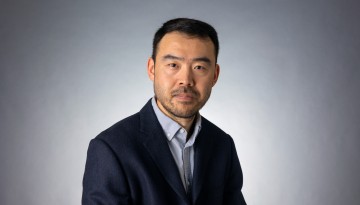Cornell University Appoints Zhang as Provost’s Fellow for Public Engagement
Max Zhang, the Irving Porter Church Professor in Cornell Engineering’s Sibley School of Mechanical and Aerospace Engineering, has been appointed the provost’s fellow for public engagement.
Zhang will work with staff members in the Office of the Vice Provost for Engagement and Land-Grant Affairs and the Einhorn Center for Community Engagement, as well as administrators and stakeholders across the university, to advance Cornell’s public engagement mission and initiatives around community-engaged learning and research.
Zhang is the sixth faculty member to hold this position in an initiative started in 2011 as a way to strengthen Cornell’s capacity to support public engagement. His three-year appointment began July 1. He will report to Vice Provost for Engagement and Land-Grant Affairs Katherine McComas.
“I’m thrilled to work with Max in this capacity,” said McComas. “His deep experience with building community partnerships and ensuring the broader impacts of his research are exemplary. We’ve already hit the ground running strategizing about ways to expand the visibility and opportunities for public engagement across the university.”
Zhang joined Cornell in 2006. His interdisciplinary research spans a range of energy and environmental systems, always with an eye towards societal impact.
His research on near-road air pollution has guided community-led efforts to mitigate the impact of traffic-related emissions across the U.S. and contributed to the scientific basis for the transportation green infrastructure planting guideline released by the Environmental Protection Agency. He has worked with communities and municipalities throughout New York state on projects such as developing an energy roadmap for Tompkins County that would reduce its greenhouse gas emissions, and identifying excessive residential wood smoke in Ithaca.
A recent focus of Zhang’s engaged research is the Internet of Things (IoT), a concept that highlights the digital connections between everyday items, from thermostats to home appliances to environmental monitoring, and the networks that support them.
Zhang launched an initiative to design the first statewide public IoT network in the U.S. that combines broadband with low-power wide-area network technology to bridge the digital divide between rural and non-rural regions. The initiative has spurred efforts in microclimate monitoring at solar farms and hyperlocal weather forecasting, as well as improving local food security and rural healthcare access. Recently, Zhang’s team has partnered with municipalities such as Binghamton, Syracuse and Geneva to design their public IoT networks.
In 2017, Zhang was awarded Cornell’s Engaged Scholar Prize for devoting his career to the development of sustainable communities. His course “Introduction to the Internet of Things – Technology and Engagement,” which creates collaborations between students and upstate communities, was honored with a Cornell Town-Gown Award in 2022.
“In Cornell Engineering, we aim to produce graduates who are prepared to be leaders in improving our society, and research that makes a meaningful difference in the world,” said Lynden Archer, the Joseph Silbert Dean of Engineering. “Max embodies this commitment, working to create incredible opportunities for his students and his work to make an immediate impact.”
Engaged learning is supported by three pillars, according to Zhang: results, process and relationship.
“In a typical classroom, education depends on results, because you can grade the students based on their results. But in the real world, especially in terms of engagement, the relationship-building and the process of working with your partners are equally important,” he said. “Sometimes you don’t achieve the original goal or expected results, but because you build this relationship, that can help you either achieve the same goal in the future or open up more opportunities for impact. However, this is really hard to teach in a classroom.”
One of Zhang’s key goals as provost’s fellow is to attain 100% of undergraduates participating in public engagement activities by 2026, and to ensure that participation is sustainable year after year. The benefits, to the community as well as the students, are manifold.
“It’s important to expose our students to real-world problem-solving and also give them the confidence that they can make a difference,” said Zhang, a Cornell Atkinson faculty fellow who served as the Marble Faculty Director at Cornell Atkinson from 2021-24. “Sometimes it could be a small difference. But they can make an impact in the real world.”
Another central focus is the Engaged College Initiative, a collaboration with undergraduate colleges and schools that seeks to make community-engaged learning a central part of their curricular, co-curricular and research programs. Having a network of engaged colleges that shares ideas, opportunities and learned lessons is critical to making public engagement a part of Cornell’s identity.
“I’m very grateful that Cornell has this public engagement initiative,” Zhang said. “Not many institutions prioritize it, and being in an institution that recognizes and celebrates this makes me and my colleagues feel very engaged.”

